Description
NST1501 Assignment 2 Memo | Due 17 June 2025. All questions fully answered. Assignment 02
QUESTION 1
Answer the following questions by filling in the missing word(s)
1.1 Define matter. (2)
Matter is anything that ________ space and has ________.
1.2 What are molecules made of? (2)
Molecules are groups of ________ bonded together.
1.3 Describe the particle arrangement in a solid. (2)
In a solid, particles are ________ together.
1.4 At what temperature do particles of matter move? (1)
Particles of matter move at any temperature above ________ Celsius.
1.5 Explain how temperature affects the state of matter. (2)
When temperature ________, the state of matter can ________ from one form to another.
1.6 What happens to the particles when a substance freezes? (1)
When a substance freezes, the particles ________.
[10]
QUESTION 2
State whether the following statements are true or false:
2.1 Changes of states of matter occur due to a change in temperature.
2.2 When water is exposed to any temperature lower than room temperature, it will freeze.
2.3 Vaporization is the process where a substance changes directly from a solid to a gas without passing through the liquid state.
2.4 There are six changes of states of matter.
4
2.5 Deposition is the reverse process of sublimation, where a gas changes directly to a solid without becoming a liquid first.
[10]
QUESTION 3
Based on section 1.5 of study unit 1, answer the following questions on assessment
3.1 What is the purpose of assessment in a classroom? (2)
3.2 According to Neluheni (2011), how does he define assessment? (2)
3.3 Why is assessment important in the teaching and learning process? (2)
3.4 What does the equation “What is assessed → Becomes what is valued → What is taught” signify? (2)
3.5 What challenges are associated with traditional assessment
approaches? (2)
[10]
QUESTION 4
Answer the following questions by choosing the correct option:
4.1 Which system is responsible for breaking down food into smaller dissolvable nutrients?
A) Respiratory system
B) Digestive system
C) Nervous system
D) Muscular system
4.2 What is the primary function of the digestive system?
A) Transporting oxygen to cells
B) Removing waste products from the body
NST1501/101
5
C) Breaking down food into soluble nutrients
D) Pumping blood throughout the body
4.3 Which process occurs during ingestion in the digestive system?
A) Absorption of nutrients
B) Elimination of waste
C) Taking food into the mouth
D) Chemical digestion
4.4 What is the role of the circulatory system?
A) Digesting food
B) Transporting nutrients and oxygen
C) Producing hormones
D) Filtering waste products
4.5 Which organ is part of the circulatory system?
A) Liver
B) Kidney
C) Heart
D) Lungs [10]
QUESTION 5
5.1 Discuss the key differences between plant and animal cells based on the presence and function of vacuoles, chloroplasts, and cell walls. Explain why these differences are significant in terms of the cells’ functions and overall roles within the organism.
(20)
5.2 Differentiate, with examples, between summative assessment and formative assessment. (10)
Marking distribution:
Definition of summative assessment (3)
Definition of formative assessment (3)
Example of summative assessment (2)
Example of formative assessment (2)
5.3 Discuss the flow of blood in a human body. Use the left ventricle as a starting
point and ensure to make mention of all major structures in the hear. (10)








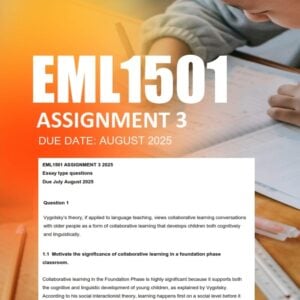

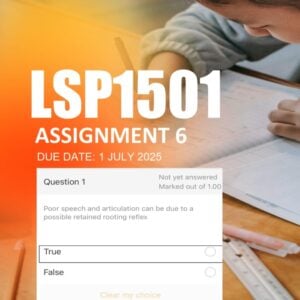









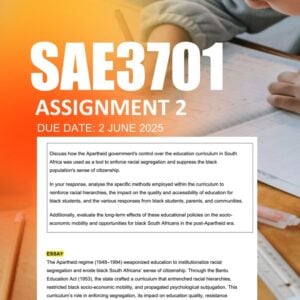
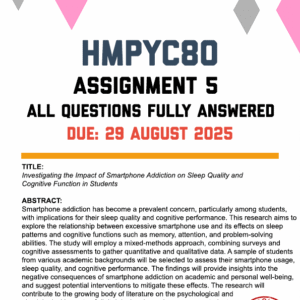

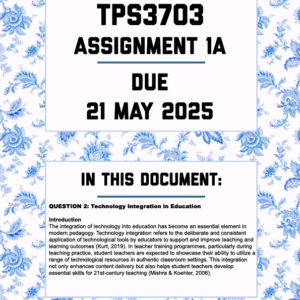


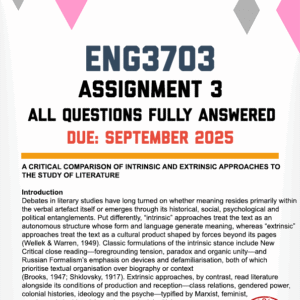

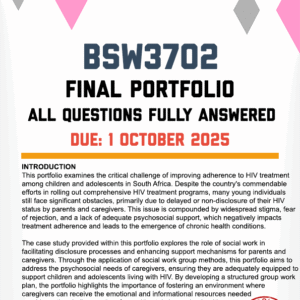




Reviews
There are no reviews yet.